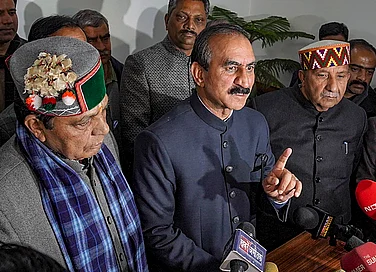THE action was quick and sudden, but not unexpected. That the axe would fall on Shankersinh Vaghela and his camp had become obvious at the BJP's June 21-23 national executive meet in Bhopal. Two days later, party President L.K. Advani replaced Gujarat BJP chief Kashiram Rana with state Finance Minister Wajubhai Bala. In a clear signal that dissidence would not be tolerated in the party even if it meant the fall of the government, Keshubhai Patel was put in charge of Gujarat affairs in place of K.L. Sharma. Patel had been appointed senior vice-president in Delhi in November—two months after his ouster as chief minister following the Vaghela-led coup—but was not comfortable away from Gujarat.
The action followed immediate disapproval by 15 legislators, including six ministers, who wanted the high command to reconsider it, besides resignation by 61 out of 98 councillors in Rana's hometown Surat (which were withdrawn later under threat of action from Delhi). But the mood in the party this time was for a hardline. Even Atal Behari Vajpayee, BJP General Secretary Pramod Mahajan and Rajasthan Chief Minister Bhairon Singh Shekhawat finally okayed
Advani's move for a tough stand. The three leaders are considered the principal architects of the peace formula in September—that Patel should bow down and Vaghela's supporters be given due representation in the state organisation and government. But Advani argued that "indiscipline" was spilling over to other states, including Bihar, and that a deterrent action would send across the right signal.
For his part, Rana said: "This would send a wrong signal to the state's backward classes. Also, I was punished for the fault of others. It was the group supporting Keshubhai Patel that indulged in indiscipline, including assault of senior minister Atmaram Patel on May 20." He shot off a letter to Advani alleging that his removal came as a reward to the Patel-Narendra Modi nexus which was out to promote factionalism and casteism in the state.
But what hastened Rana's exit (which had been put off because of the general elections) were the reports by central observers that Vaghela, Rana and Chief Minister Suresh Chandra Mehta had formed a nexus and were working autonomously. The party took a precaution in choosing Rana's successor who, like him, belongs to the backward castes and has been the mayor of Rajkot for eight years.
While Vaghela is trying to win over some front organisations of the BJP, including its kisan cell, heavy RSS presence has been something of a deterrent. Vaghela is also said to be in touch with Ranjan Yadav, a Rajya Sabha member from Bihar and a close aide of Laloo Prasad Yadav.
In fact, Vaghela had anticipated Rana's exit. An indication came when Vajpayee nominated him the party's deputy chief whip in the Lok Sabha. Advani had told him on June 18 at Nagpur, during Balasaheb Deoras' funeral, about the impending change in the state leadership. Moreover, Rana ignored Advani's invitation to meet him in Delhi on June 24 to discuss Gujarat affairs. Rana instead went to Ahmedabad to meet his supporters. He is said to have been closeted with state minister Vipul Choudhary, a Vaghela man, when the party headquarters called, asking whether he was going to Delhi. He was replaced the very next day.
The party believes that since September there has been a massive erosion in Vaghela's support within the legislature party. At least 20 out of 41 legislators who went to Khajuraho with him in an effort to bring down the Keshubhai government had met Advani and pledged their loyalty to the party. Vaghela's defeat in the Lok Sabha election from Godra constituency following an active campaign against him by VHP and RSS activists also made some of his erstwhile supporters reconsider their stand.
According to the BJP's assessment, Vaghela and his followers do not seem to be in a position to split the 121-member BJP legislature party and form a coalition government with the 45 Congress members in the 182-member assembly. "Even if they are prepared to go that far, we should take stringent action against them. We are not going to have any compromise," a state party office functionary said. The chief minister has been told that he will not be replaced if he completely dissociates himself from the Vaghela camp. An assurance to this effect was given on Advani's behalf to Mehta's trusted cabinet colleagues Fakir Vaghela, Arbind Patel and Bhupendra Singh.
But, with the fallout of the disciplinary action unclear, the move to reconstruct the coordination committee and the state organisation has been shelved for about a week. However, that restructuring will get top priority is obvious from the fact that Bala has been asked to quit the ministry and strengthen the organisation. But the worst may not be over as yet as expelling the rebels could erode the party's strength while keeping them could mean a continuity in the tug of war for power.


























